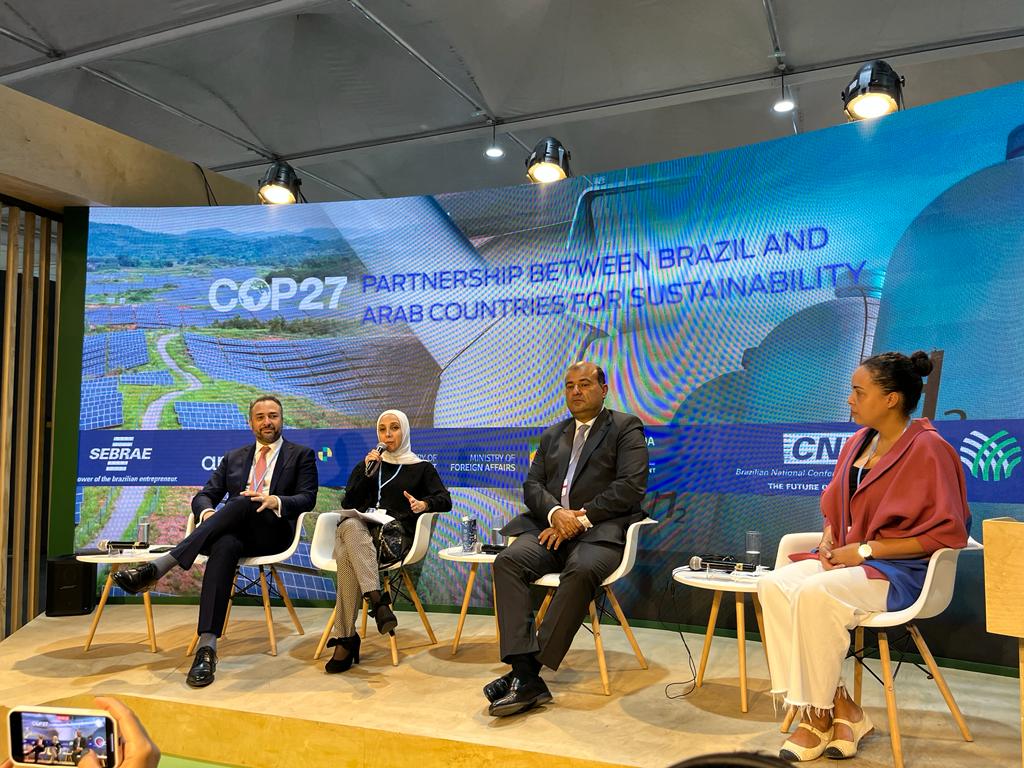Sharm El Sheikh – Brazil and the Arab countries are expected to increase their partnership for sustainable business. The two regions already share a strong trade, and leaders from the private sector argued on Friday (11) at the United Nations Climate Change Conference (COP27) in Egypt that this collaboration should be extended to projects that help the world meet its emission reduction targets. The partnership between Brazil and Arab countries was the topic of a panel in the Brazil Pavilion at COP27.
The event featured Union of Arab Chambers secretary-general Khaled Hanafy, the Arab Academy for Science, Technology & Maritime Transport’s College of International Transport and Logistics dean and Union of Arab Chambers consultant Sara Hassan Kamal Elgazzar, and Arab Brazilian Chamber of Commerce (ABCC) secretary-general & CEO Tamer Mansour, and it was moderated by ABCC Institutional Relations director Fernanda Baltazar. Pictured, from right to left, Mansour, Elgazzar, Hanafy and Baltazar.
Hanafy said there currently are different types of collaboration between Brazil and the Arab countries in sustainable business, and that the Arabs plan on having green, environmentally friendly business. “One of the key elements of this partnership is the carbon market. Brazil has a surplus and is ready to sell, and the Arab countries are ready to buy,” the secretary-general said, referring to carbon emission reduction.
The maritime transport between Brazil and the Arab countries also has a large environmental impact, Hanafy said. He referred to initiatives that could consider a maritime transport with clean energy, as shipping emissions are very high. The secretary-general also mentioned commodities, which could be more sustainable. “There are good tools for our collaboration,” he said.
Sara Elgazzar said that the countries could engage in strategic partnerships to reduce environmental impacts on both the Brazilian and Arab side. According to her, there are various initiatives for sustainability in the Arab countries, and she mentioned one in the United Arab Emirates, which will host the COP28 in Dubai next year. “Masdar, for example, is a renewable energy company that invests in several countries around the Middle East and North Africa (MENA) region,” she said.
Tamer Mansour stressed that the Arab countries has hosted large global events since last year, with Expo 2020 Dubai in the UAE and the World Cup in Qatar, not to mention next year’s COP28 in Dubai. “The Arabs are thus investing in agriculture, infrastructure, logistics and transport, and this all revolves around food security and sustainability,” the ABCC’s secretary-general said.
The Arabs want to ensure high-quality food security, and they are changing their mindset regarding their investments. “Now they are investing not only because of their financial return but also sustainability,” Mansour said.
Hanafy said that in order to create more sustainable projects in the partnership between Brazil and the Arab countries, it’s necessary to work for integrating the Brazilian and Arab private sectors. Besides food security, he mentioned water as a topic that is very dear to the Arabs. “We need more and more technology and sustainable business to avoid the water scarcity. We could create value to sustainability and show that it creates large opportunities,” he said.
The three panelists mentioned that the key for this partnership around sustainability is the strategic alliance between the parties. “We want to bridge the gap between Brazil and the Arab countries,” Hanafy said.
Translated by Guilherme Miranda




